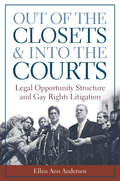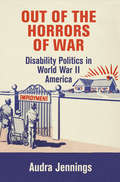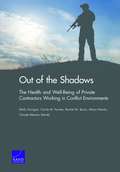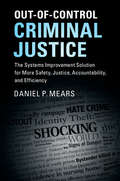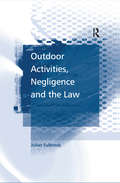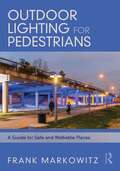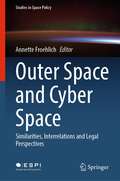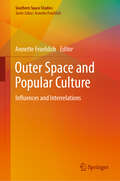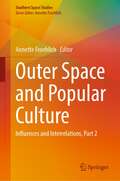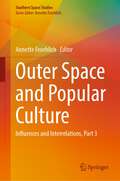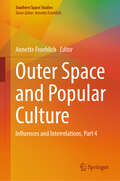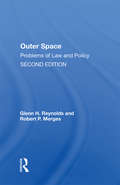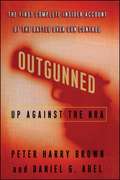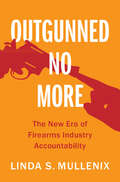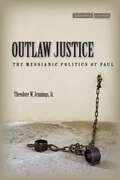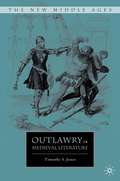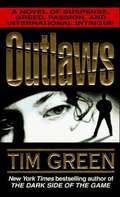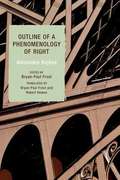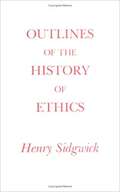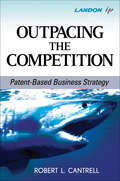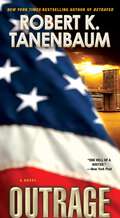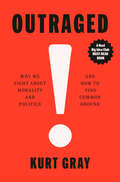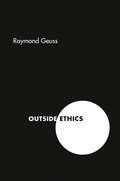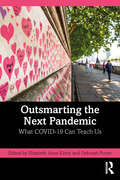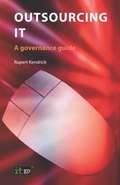- Table View
- List View
Out of the Closets and into the Courts: Legal Opportunity Structure and Gay Rights Litigation
by Ellen Ann AndersenExamining the efforts of Lambda Legal Defense and Education Fund and other groups to advance gay rights through litigation in the US courts, Andersen (political science, Indiana U. -Purdue U. Indianapolis) ask under what circumstances claims are more likely to prevail and what impact litigation outcomes have on the real lives of gay, lesbian, and bisexual people. His analysis employs the concept of legal opportunity structures that are analogous to commonly articulated dimensions of political opportunity structure--access to the formal institutional structure, the configuration of power with respect to relevant issues, and the availability of allies--and also describes how legal opportunity structures differ from their political counterparts due to the constraints of legal frames that structure the kinds of legal claims that can be made, facts that are considered relevant, and the persuasiveness of claims. Annotation ©2007 Book News, Inc., Portland, OR (booknews.com)
Out of the Horrors of War: Disability Politics in World War II America (Politics and Culture in Modern America)
by Audra JenningsFrom workplace accidents to polio epidemics and new waves of immigration to the returning veterans of World War II, the first half of the twentieth century brought the issue of disability—what it was, what it meant, and how to address it—into national focus. Out of the Horrors of War: Disability Politics in World War II America explores the history of disability activism, concentrating on the American Federation of the Physically Handicapped (AFPH), a national, cross-disability organization founded during World War II to address federal disability policy. Unlike earlier disability groups, which had been organized around specific disabilities or shared military experience, AFPH brought thousands of disabled citizens and veterans into the national political arena, demanding equal access to economic security and full citizenship. At its core, the AFPH legislative campaign pushed the federal government to move disabled citizens from the margins to the center of the welfare state.Through extensive archival research, Audra Jennings examines the history of AFPH and its enduring legacy in the disability rights movement. Counter to most narratives that place the inception of disability activism in the 1970s, Jennings argues that the disability rights movement is firmly rooted in the politics of World War II. In the years immediately following the war, leaders in AFPH worked with organized labor movements to advocate for an ambitious political agenda, including employer education campaigns, a federal pension program, improved access to healthcare and education, and an affirmative action program for disabled workers. Out of the Horrors of War extends the arc of the disability rights movement into the 1940s and traces how its terms of inclusion influenced the movement for decades after, leading up to the Americans with Disabilities Act of 1990.
Out of the Shadows: The Health and Well-Being of Private Contractors Working in Conflict Environments
by Rachel M. Burns Molly Dunigan Claude Messan Setodji Carrie M. Farmer Alison HawksPrivate contractors have been deployed extensively around the globe for the past decade and may be exposed to many of the stressors that are known to have physical and mental health implications for military personnel. Results from a RAND survey offer preliminary findings about the mental and physical health of contractors, their deployment experiences, and their access to and use of health care resources.
Out-of-Control Criminal Justice: The Systems Improvement Solution for More Safety, Justice, Accountability, and Efficiency
by Mears Daniel P.Out-of-Control Criminal Justice shows that our system of criminal justice is broken; it is out of control. The author writes that a research-based strategy is needed that builds on the insights of those who work within criminal justice or are affected by it. Such a strategy must entail continuous evaluation and improvement, so that what works can be expanded and what does not can be eliminated. Out-of-Control Criminal Justice identifies how systems problems plague our criminal justice systems. It then presents a comprehensive strategy for bringing these systems under control to reduce crime, to increase justice and accountability, and to do so at less cost. The strategy can be used, too, to create greater responsiveness to victims and communities, effectiveness in reducing racial and ethnic disparities, and understanding of the causes and consequences of crime. After describing this new approach, the book identifies the tools needed to implement a systems solution to create a safer and more just society.
Outdoor Activities, Negligence and the Law
by Julian FulbrookRecent years have witnessed several tragedies during school and youth expeditions. This in turn has led to legislation and the tight regulation of Outdoor Activity Centres, with successive governments issuing guidelines for teachers and others supervising such activities. Inevitably there will always be risk in relation to adventurous pursuits in the outdoors, but the law in this area seeks a balance between the educational benefits gained and the need to safeguard against potential hazards. Mythologies have arisen, including the suggestion that a 'blame culture' is so overwhelming that no youth worker or teacher can sensibly engage anymore in such activities. This succinct guide to the legal position refers to a wide range of outdoor activities and recent legal cases. It demolishes some of the myths, pointing out common pitfalls noted in the research and in the litigation, together with an outline of robust safety features to combat potential hazards.
Outdoor Lighting for Pedestrians: A Guide for Safe and Walkable Places
by Frank MarkowitzOutdoor Lighting for Pedestrians shows how outdoor lighting is important for pedestrians’ safety, personal security, and comfort, with major impacts on street, path, and park aesthetics and neighborhood sense of place. Providing clear, basic technical background (accessible to non-engineers), the book focuses especially on planning and policy concerns. It covers the fundamentals of lighting technology; benefits, costs, and possible adverse impacts of lighting enhancements; traditional and innovative approaches; planning and policy documents and practices; aesthetics and placemaking; and technology trends in lighting design. This book is aimed primarily at practicing transportation planners and engineers, generalist urban planners, safety advocates and researchers, and university students. However, lighting designers and other professionals will also find it useful. It considers how lighting can be coordinated with other potential improvements to enhance the pedestrian environment for better walkability.
Outer Space and Cyber Space: Similarities, Interrelations and Legal Perspectives (Studies in Space Policy #33)
by Annette FroehlichThe book analyses a broad range of relevant aspects as the outer space and cyber space domain do not only present analogies but are also strongly interrelated. This may occur on various levels by technologies but also in regard to juridical approaches, each nevertheless keeping its particularities. Since modern societies rely increasingly on space applications that depend on cyber space, it is important to investigate how cyberspace and outer space are connected by their common challenges. Furthermore, this book discusses not only questions around their jurisdictions, but also whether the private space industry can escape jurisdiction by dematerializing the space resource commercial processes and assets thanks to cyber technology. In addition, space and cyberspace policies are analysed especially in view of cyber threats to space communications. Even the question of an extra-terrestrial citizenship in outer space and cyberspace may raise new views. Finally, the interdependence between space and cyberspace also has an important role to play in the context of increasing militarization and emerging weaponization of outer space. Therefore, this book invites questioning the similarities and interrelations between Outer Space and Cyber Space in the same way as it intends to strengthen them.
Outer Space and Popular Culture: Influences and Interrelations (Southern Space Studies)
by Annette FroehlichThis book provides detailed insights into how space and popular culture intersect across a broad spectrum of examples, including cinema, music, art, arcade games, cartoons, comics, and advertisements. This is a pertinent topic since the use of space themes differs in different cultural contexts, and these themes can be used to explore various aspects of the human condition and provide a context for social commentary on politically sensitive issues. With the use of space imagery evolving over the past sixty years of the space age, this is a topic ripe for in-depth exploration. The book also discusses the contrasting visions of space from the late 19th and early 20th centuries and the reality of today, and analyzes space vehicles and habitats in popular depictions of space from an engineering perspective, exploring how many of those ideas have actually been implemented in practice, and why or why not (a case of life imitating art and vice versa). As such, it covers a wide array of relevant and timely topics examining intersections between space and popular culture, and offering accounts of space and its effect on culture, language, and storytelling from the southern regions of the world.
Outer Space and Popular Culture: Influences and Interrelations, Part 2 (Southern Space Studies)
by Annette FroehlichFollowing on from Part 1, which was highly acclaimed by the space community, this peer-viewed book provides detailed insights into how space and popular culture intersect across a broad spectrum of areas, including cinema, music, art, arcade games, cartoons, comics, and advertisements. This is a pertinent topic since the use of space themes differs in different cultural contexts, and these themes can be used to explore various aspects of the human condition and provide a context for social commentary on politically sensitive issues. With the use of space imagery evolving over the past sixty years of the space age, this topic is ripe for in-depth exploration. Covering a wide array of relevant and timely topics, the book examines the intersections between space and popular culture, and offers accounts of space and its effect on culture, language, and storytelling from the southern regions of the world.
Outer Space and Popular Culture: Influences and Interrelations, Part 3 (Southern Space Studies)
by Annette FroehlichThis book provides detailed insights into how space and popular culture intersect across a broad spectrum of examples, including cinema, music, art, arcade games, cartoons, comics, and advertisements. This is a pertinent topic since the use of space themes differs in different cultural contexts, and these themes can be used to explore various aspects of the human condition and provide a context for social commentary on politically sensitive issues. With the use of space imagery evolving over the past sixty years of the space age, this is a topic ripe for in-depth exploration. The book also discusses the contrasting visions of space from the late nineteenth and early twentieth centuries and the reality of today and analyzes space vehicles and habitats in popular depictions of space from an engineering perspective, exploring how many of those ideas have actually been implemented in practice and why or why not (a case of life imitating art and vice versa). As such, it covers a wide array of relevant and timely topics examining intersections between space and popular culture and offering accounts of space and its effect on culture, language, and storytelling from the southern regions of the world.
Outer Space and Popular Culture: Influences and Interrelations, Part 4 (Southern Space Studies)
by Annette FroehlichFollowing on from the highly acclaimed Parts 1 to 3, this book provides detailed insights into how space and popular culture intersect across a broad spectrum of examples, including cinema, music, art, arcade games, cartoons, comics, and advertisements. This is a pertinent topic since the use of space themes differs in different cultural contexts, and these themes can be used to explore various aspects of the human condition and provide a context for social commentary on politically sensitive issues. With the use of space imagery evolving over the past sixty years of the space age, this is a topic ripe for in-depth exploration. The book also discusses the contrasting visions of space from the late nineteenth and early twentieth centuries and the reality of today and analyzes space vehicles and habitats in popular depictions of space from an engineering perspective, exploring how many of those ideas have actually been implemented in practice and why or why not (a case of life imitating art and vice versa). As such, it covers a wide array of relevant and timely topics examining intersections between space and popular culture and offering accounts of space and its effect on culture, language, and storytelling from the southern regions of the world.
Outer Space: Problems Of Law And Policy
by Glenn Reynolds Robert MergesThis book examines the international and domestic American legal problems associated with activity in outer space from a strong policy perspective, with particular attention given to problems associated with space commercialization and with military activities in outer space. Outer Space: Problems of Law and Policy is indispensable as a casebook, reference, and self-teaching tool for students, practitioners, academics, and members of the aerospace industry.
Outgunned
by Peter Harry Brown Daniel G. AbelOurs is a nation in the grip of a strange kind of mania. Why after President Reagan was shot was there virtually no handgun legislation? Why after the Columbine massacre in Littleton, Colorado, was nothing done to regulate the tools that children most frequently use to kill one another? Why was there no legislative response after a six-year-old in Flint, Michigan, shot a classmate with a .32 caliber "pocket rocket"? Tragedy follows tragedy, with twelve children shot dead every day in America, but guns remain less regulated than automobiles. Why? As authors Peter Harry Brown and Daniel G. Abel in this powerful book demonstrate, it is because of the terrible power of the gun coalition. Outgunned begins with the story of Wendell Gauthier, the "master of disaster" attorney, who brought down the tobacco industry to the tune of billions and then turned his attention to guns. He struck fear into the hearts of the gun manufacturers as he set out to make gunmakers bear some liability for the killings caused by the often poorly made, inaccurate handguns they marketed to criminals. Coauthor Daniel G. Abel worked for Gauthier, along with other attorneys, as the gun-control campaign gathered momentum. This legal initiative seemed to be about to make history and change the face of violence in America, but sadly, Wendell Gauthier died of cancer before meaningful gun control could be established. More than thirty class-action suits against gun manufacturers now languish in courtroom paralysis while as many Saturday night specials as ever are being made. What happened? Brown and Abel demonstrate how the pro-gun forces once again curbed the will of a nation. This book shows the enomous power of the NRA -- how it killed pending legislation in Congress, hijacked the Campaign Act to fund the George W. Bush presidential election victory, and eviscerated the American Shooting Sports Council. That association and the gun manufacturers actually wanted to compromise and agree to new handgun laws, implicitly accepting some liability, but the NRA leadership, with Charlton Heston as their president, crushed them. In Outgunned, Brown and Abel uncover how NRA lobbyists were instrumental in stopping Smith & Wesson in its tracks. They show how the tendrils of the NRA reach into the Christian Alliance and Republican Party, and how men like John McCain have fought back and been undermined. Outgunned reveals how the NRA began dealing with President George W. Bush when he was still governor of Texas -- prodding him into signing a shocking prohibition against the kind of suits Gauthier brought against the gun manufacturers. Outgunned is the story of a legal crusade with up-close accounts of the people who fought every step of the way. For those who believe in the importance of stopping unnecessary bloodshed, this book is essential, powerful, and urgent.
Outgunned No More: The New Era of Firearms Industry Accountability
by Linda S. MullenixOutgunned No More comprehensively addresses the changed legal landscape under which governments and private citizens can sue the gun industry for contributing to and sustaining the gun violence epidemic in the US and Mexico. The book canvasses federal and state efforts to regulate firearms through gun control measures, arguing that these regulatory measures have proven ineffective to stem gun violence. Instead, recourse to robust consumer protection and mass tort litigation provides the best avenue for holding the firearms industry accountable. Chapters highlight three important interventions: the 1998 Tobacco Master Settlement Agreement, the Connecticut Sandy Hook Elementary School litigation, and the recent enactment of consumer protection and public nuisance firearms statutes in nine states. These innovative statutes have created an avenue for litigation that overcomes the firearm industry's historical immunity. Outgunned No More concludes that a firearms mass tort litigation, modeled after the resolution of claims in the tobacco industry, is the best path forward.
Outlaw Justice: The Messianic Politics of Paul (Cultural Memory in the Present)
by Theodore W. Jennings Jr.This book offers a close reading of Romans that treats Paul as a radical political thinker by showing the relationship between Paul's perspective and that of secular political theorists. Turning to both ancient political philosophers (Plato, Aristotle, and Cicero) and contemporary post-Marxists (Agamben, Badiou, Derrida, and Žižek), Jennings presents Romans as a sustained argument for a new sort of political thinking concerned with the possibility and constitution of just socialities. Reading Romans as an essay on messianic politics in conversation with ancient and postmodern political theory challenges the stereotype of Paul as a reactionary theologian who "invented" Christianity and demonstrates his importance for all, regardless of religious affiliation or academic guild, who dream and work for a society based on respect, rather than domination, division, and death. In the current context of unjust global empires constituted by avarice, arrogance, and violence, Jennings finds in Paul a stunning vision for creating just societies outside the law.
Outlawry in Medieval Literature
by Timothy S. JonesDrawing on new historical principles, this book examines literary and historical narratives, legal statutes and records, sermons, lyric poetry, and biblical exegesis circulating in medieval England in order to theorize the figure of the outlaw and uncover the legal, ethical, and social assumptions that underlie the practice of outlawry.
Outlaws
by Tim GreenCody Grey, the Texas Outlaws' assassin on the football field, is facing up to the harsh reality that both his marriage and his pro career are grinding to a painful close. Then comes the broadside tackle that could bench him permanently - and arrest for the murder of the slimy IRS agent who was out to nail him. Only one woman can save him. A brilliant lawyer, Madison McCall reluctantly takes Cody on as a client. Madison risks everything to save a life, solve a murderous puzzle, and keep herself from getting killed along the way.
Outline of a Phenomenology of Right
by Robert Howse Alexandre Kojève Bryan-Paul FrostAlexandre Koj_ve offers a systematic discussion of key themes such as right, justice, law, equality, and autonomy in which he presages our contemporary world of economic globalization and international law. Edited and translated (with Robert Howse) by Bryan-Paul Frost, this is the authoritative English language translation of a monumental work in political philosophy.
Outpacing the Competition
by Robert L. CantrellPraise for Outpacing the Competition Patent-Based Business Strategy "Outpacing the Competition provides a useful IP management framework for rapidly evolving and inherently unpredictable R&D environments where companies are partners, customers, and competitors at the same time. " -Marshall Phelps, Corporate Vice President for IP Policy & Strategy, Microsoft "Robert Cantrell's book Outpacing the Competition: Patent-Based Business Strategy?should be read by?anyone?involved in the practice of litigating or licensing patent rights or policymakers responsible for patent issues. Mr. Cantrell provides a cogent approach for applying decisional methodology and game theory to enhance the utilization and understanding of patent rights. "-Bradley J. Olson, Esq. , patent attorney, Washington, DC "Robert Cantrell makes a compelling case for using intellectual property as a core for building solid business strategy. He provides a unique and valuable perspective on competitive advantage, as delivered through patent-based business strategy. This is an excellent addition to anyone's business strategy arsenal. " -Jeff Hovis, Managing Principal, Product Genesis, Innovation Genesis LLC "Robert truly treats patents and related intellectual property as both a weapon and a shield to help the reader use patents to out-maneuver global competitors of all kinds-the low-cost producer, the high-end innovator, etc. CEOs, attorneys, business and engineering professionals and the like will enjoy the military imagery and flavor provided by Robert. Thanks for clarifying how critical it is to have an understanding of patents in running a truly competitive global business today. " -José W. Jimenez, Esq. , Chief Intellectual Property Officer,AMS Research Corporation
Outrage (A Butch Karp-Marlene Ciampi Thriller #23)
by Robert K. TanenbaumIn Robert K. Tanenbaum’s electrifying thriller, District Attorney Butch Karp battles a failure of the system, a police detective desperate to solve a case for his own ends, and a homicidal maniac who will stop at nothing to protect the truth. Months after a brutal double homicide in uptown Manhattan shocks the city, sensational newspaper headlines herald the arrest and indictment of Felix Acevedo, a shy Bronx teenager who confessed to the horrific crimes. But downtown, in the district attorney’s office, Butch Karp is seething. No sooner does he bask in the relief of successfully closing the case on murderous imam Sharif Jabbar than he is thrust into the center of a high-profile prosecution that threatens the integrity of his office. An ambitious young assistant district attorney, seeking career advancement, cuts corners to indict Acevedo, disregarding Karp’s fundamental rule: Never charge the accused unless the evidence leads inexorably to proof beyond a reasonable doubt. Now, damned by a coerced confession and a frenzied media bent on lynching him, Acevedo sits in jail while a vicious killer stalks the city. Karp’s wife, Marlene Ciampi, one half of the “crime-fighting family” proclaimed by the media, hits the streets for clues that will save the unjustly accused defendant. What she discovers puts her on the trail of the true perpetrator—a drug-addicted psychopath with an ax to grind—and a disgruntled police detective who is willing to lie, withhold evidence, and kill to be labeled a hero. But it also puts her in the center of a dangerous race to be the last man standing and if she’s not careful, one of the other players will take the prize. From the gruesome crime scene to a trial that will leave readers on the edge of their seats, Robert K. Tanenbaum’s unstoppable novel unfolds at breakneck speed as Karp and Ciampi fight for justice in a dramatic and challenging case that will thrill readers to the bone.
Outraged: Why We Fight About Morality and Politics and How to Find Common Ground
by Kurt GrayA groundbreaking new perspective on the moral mind that rewrites our understanding of where moral judgments come from, and how we can overcome the feelings of outrage that so often divide usIt&’s easy to assume that liberals and conservatives have radically different moral foundations. In Outraged, Kurt Gray showcases the latest science to demonstrate that we all have the same moral mind—that everyone&’s moral judgments stem from feeling threatened or vulnerable to harm.We all care about protecting ourselves and the vulnerable. Conflict arises, however, when we have different perceptions of harm. We get outraged when we disagree about who the &“real&” victim is, whether we&’re talking about political issues, fights with our in-laws, or arguments on the playground.In this fascinating and insightful tour of our moral minds, Gray tackles popular myths that prevent us from understanding ourselves and those around us. While it is commonly believed that our ancestors were apex predators, Gray argues that for the majority of our evolutionary history, humans were more hunted than hunter. This explains why our minds are hard-wired to perceive threats, and provides surprising insights on the scientific origins of our values and beliefs. Though we might think ourselves driven by objective reasoning, Gray unveils new research that finds our moral judgments are based on gut feelings rather than rational thought, and presents a compelling reminder that we are more alike than we might think.Drawing on groundbreaking research, Gray provides a captivating new explanation for our moral outrage, and unpacks how to best bridge divides. If you want to understand the morals of the &“other side,&” ask yourself a simple question—what harms do they see?
Outside Ethics
by Raymond GeussOutside Ethics brings together some of the most important and provocative works by one of the most creative philosophers writing today. Seeking to expand the scope of contemporary moral and political philosophy, Raymond Geuss here presents essays bound by a shared skepticism about a particular way of thinking about what is important in human life--a way of thinking that, in his view, is characteristic of contemporary Western societies and isolates three broad categories of things as important: subjective individual preferences, knowledge, and restrictions on actions that affect other people (restrictions often construed as ahistorical laws). He sets these categories in a wider context and explores various human phenomena--including poetry, art, religion, and certain kinds of history and social criticism--that do not fit easily into these categories. As its title suggests, this book seeks a place outside conventional ethics. Following a brief introduction, Geuss sets out his main concerns with a focus on ethics and politics. He then expands these themes by discussing freedom, virtue, the good life, and happiness. Next he examines Theodor Adorno's views on the relation between suffering and knowledge, the nature of religion, and the role of history in giving us critical distances from existing identities. From here he moves to aesthetic concerns. The volume closes by looking at what it is for a human life to have "gaps"--to be incomplete, radically unsatisfactory, or a failure.
Outsmarting the Next Pandemic: What Covid-19 Can Teach Us
by Elizabeth Anne Kirley Deborah PorterThis book examines the role of law and policy in addressing the public health crisis of COVID-19 and offers reforms that could improve pandemic preparedness for future outbreaks. Focusing on a number of countries most expected to provide agility and organization in their crisis response – the United States, Canada, Australia, the United Kingdom and Taiwan – the book shows how failures in leadership from governments, executives, and institutions created a vacuum that was quickly filled by naysayers, conspiracy theorists, vaccine hucksters, and fake news generators. Through the key themes of healthcare, leadership, security, and education, the chapters address critical questions: Why have masks become such a polarizing force? How do you self-isolate if you don’t have a home? How should equitable triage models for overwhelmed frontline healthcare workers be developed? Can we utilize artificial intelligence to educate the public about manipulated information they access concerning the pandemic? The book was written during the pandemic and weaves in to each chapter vignettes with personal revelations from a broad range of countries, including some also grappling with poverty, war, natural disasters, or revolution. It will appeal to academics, professionals, and policymakers interested in how law and health policy can converge on solutions for global infectious disease. It is suitable for use in upper-level courses.
Outsourcing IT: A Governance Guide
by Rupert Kendrick"Outsourcing IT - A Governance Guide" addresses three componentsof the governance of IT outsourcing: the IT outsourcing process;the nature of governance and the use of methodologies and toolsfor the implementation of governance principles; and, themanagement of risk within the IT outsourcing process. Theobjectives of the book are first, to provide boards of directorswith clear criteria for the application of governance principlesin an IT outsourcing environment; and, second, to provideguidance on useful strategies, processes and procedures for theirimplementation. The author, Rupert Kendrick, is a non-practisingsolicitor and, for many years, was a partner in a medium-sizedlaw firm. He has written, trained and consulted widely in thelegal profession on legal IT issues.
